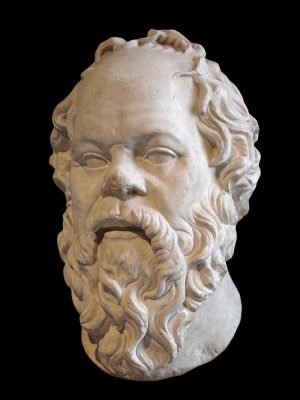The Socratic method is a type of argumentative dialogue between people who ask questions and answer each other’s questions. This cooperative asking and answering questions is the method’s way of promoting precise thinking and deducing concepts that lie beneath presumptions. The Socratic method is named after the ancient Greek philosopher Socrates. It was first presented in Plato’s dialogue Theaetetus, where it was depicted as a form of maieutics, which means “midwifery” in Greek. It has been compared to midwifery because the method of question and answer is used to draw out ideas beneath the conversationalist’s notions. These drawn-out ideas help conversationalists expand their knowledge.
It is believed that a close friend of Socrates named Chaerephon once consulted the Oracle of Delphi. The Oracle said that Socrates was the wisest man in Greece. Socrates immediately sensed the contradiction in this statement, and so he started utilizing the Socratic method in his attempt to help his perplexity.
Socrates’ method was first laid out by the philosopher Plato in prose form in his dialogues like Ion and Euthyphro. In these dialogues, Socrates was the one asking questions to a well-known Athenian who was conversing with him. Throughout Plato’s dialogues where he featured Socrates, questions about the nature of knowledge and morality are examined.
In the Socratic method, hypotheses that contain contradictions are continually discarded because, during the process of question and answer, better hypotheses that are much sounder are drawn out. The method inherently targets conventionally-accepted notions held by society and then examines them if they fit well into other conventionally-accepted notions. The fundamentals of the Socratic method are a string of questions drafted to serve as a way to check the logic of a person and, in the process, help the person uncover his opinions about certain topics. It may also help the person analyze accepted definitions and categorize common properties that are found in many specific circumstances.
Socrates’ way of teaching was through questioning, and this questioning makes the other person think harder about the exactness of his reasoning. The Socratic method has six questions.
Clarifying Concepts
Questions that clarify concepts help the conversationalists to think deeper about their topic and therefore force them to provide proof to back up their argument.
What do you mean?
How is this connected to what we have been discussing?
Can you point out examples?
Probing Assumptions
Questions that make the conversationalists examine what they believe to be unquestionable beliefs are called probing assumptions. These questions may result in the conversationalist being forced to think harder about the premises of their argument.
What else could we possibly believe?
What would you expect to happen if…?
Probing Rationale, Reasons, and Evidence
Conversationalists would do better if they asked each other for the justification for their arguments instead of simply accepting them.
What is causing this?
What evidence do you have to back up your claims?
Questioning Viewpoints and Perspectives
Arguments are based on a specific standpoint, so it is good for any conversationalist to question the standpoint itself and try to prove that there are other standpoints that are comparably logical.
Who stands to gain from this?
Why is this more advantageous than that?
How is this different from that?
Probing Implications and Consequences
A conversationalist’s argument may have logical outcomes that can be predicted.
Are the details correct?
Are they appealing?
How do these claims come together with…?
What are the implications of this assumption?
Questioning the Question
A conversationalist may turn the inquiry back on itself.
Do you have any idea why I posed this question?
What exactly does that imply?
